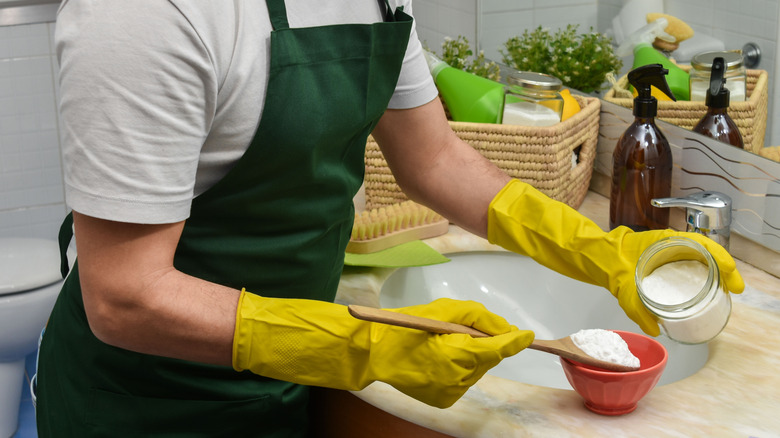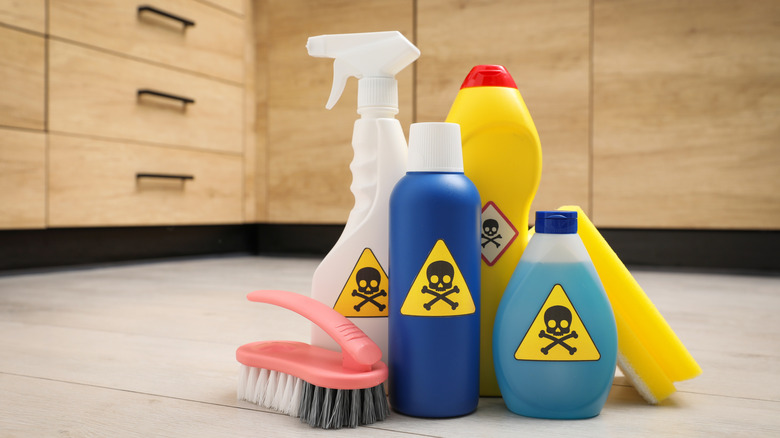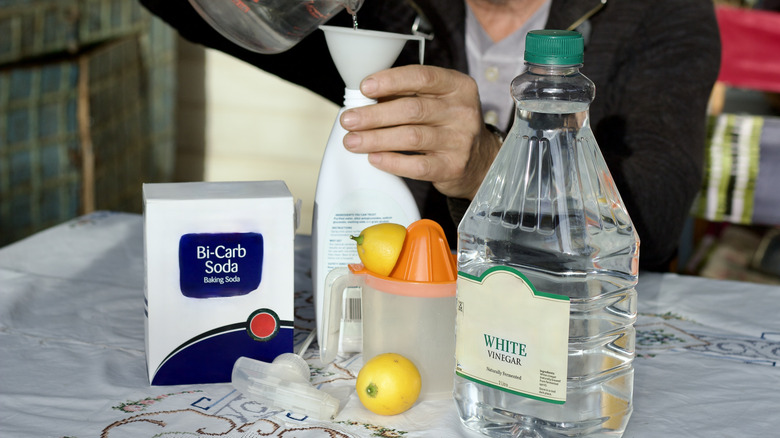The Cleaning Products You Should Never Mix With Baking Soda
Sustainable, eco-friendly cleaning is trending, and baking soda is a natural agent that people have been using for decades. With that in mind, there are a ton of baking soda cleaning hacks that are worth trying, but some substances should never be added to your natural cleaning solutions. Bleach, ammonia, and alcohol are the cleaning products you should never mix with baking soda, due to the chemical reactions they can create.
While all three are strong cleaning options on their own for deep cleaning projects, they should never be mixed, as doing so can have dangerous consequences. Additionally, combining these liquids with baking soda makes them less effective cleaners than you might expect. When mixed together with bleach, the mixture actually lowers the sanitizing power, making it counterproductive to cleaning. Ammonia and baking soda are chemically similar, and combining them can produce a corrosive mixture that causes damage. When you blend rubbing alcohol and baking soda, they don't combine well, creating a less effective, undissolved sludge rather than a paste. You certainly don't have to give up on cleaning with baking soda — it can still be safely and effectively used with vinegar, dish soap, or hydrogen peroxide.
Mixing bleach, ammonia, or alcohol can cause dangerous chemical reactions
Before mixing baking soda with any other product, it's important to understand the chemical reactions that may occur. As a base, baking soda has a pH of around 9 which requires an acid, like lemon or vinegar, to neutralize it. During this reaction, a small amount of carbon dioxide gas is released, creating a harmless byproduct of foam, water, and salt.
However when combined with other cleaning products, it can cause serious problems. For example, mixing ammonia with baking soda can set off a carbon dioxide reaction, releasing fumes that can cause respiratory issues. Adding baking soda to chlorine bleach can produce chlorinated compounds, which can also irritate the lungs. While baking soda and rubbing alcohol don't react directly, they can become dangerous when exposed to other substances like bleach or vinegar.
Most problems occur when you start playing scientist, mixing all the substances together, or even incorporating other acids, like vinegar. For example, mixing bleach, baking soda, and vinegar creates toxic chlorine gas, which can cause respiratory distress, burns, and swelling. Adding bleach is a dangerous mistake when cleaning with ammonia, which produces chloramine gas, leading to chest pain, respiratory issues, and even death. Alcohol and bleach produce chloroform, which can cause fainting, dizziness, and organ issues. Ultimately, avoid mixing cleaning substances and focus on safer ways to clean with baking soda.
How to safely use baking soda mixtures to clean
You don't need to ditch your baking soda — it can safely be used with vinegar, dish soap, or hydrogen peroxide for effective cleaning. Vinegar and baking soda are a power duo, combating water and food stains, burnt-on pieces, drain clogs, and bacteria. Since vinegar neutralizes baking soda, timing is key. Let one sit for a few minutes before applying the other for the best scrubbing and disinfecting results.
Combining dish soap and baking soda can help clean your bathroom or kitchen, as they generate a non-abrasive cleaning paste that works as a degreaser. To create this cleaning agent, mix three tablespoons of baking soda with two and a half tablespoons of dish soap. Add water, let it sit for 10 minutes, and then scrub.
Hydrogen peroxide and baking soda make an effective pair for whitening laundry, cleaning porcelain sinks, removing odors, and scrubbing grout. Since most of these cleaning hacks vary based on the task, make sure to do a little bit of research on how to combine the two appropriately. For example, to remove odors, sprinkle baking soda before spraying hydrogen peroxide; for grout, mix them into a paste.


